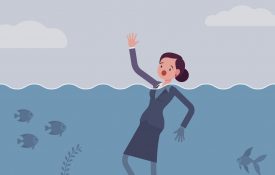-
Two Heads Are Better Than One
The Wall Street Journal: In the early 1960s, Michael S. Gazzaniga, then a graduate student at the California Institute of Technology, was one of a team of researchers who opened the minds of fellow scientists to a new view of how the brain functions. In “Tales From Both Sides of the Brain,” he tells the story of the seminal discoveries in which he was involved and chronicles the lifetime of exploration that has flowed from them. Mr. Gazzaniga’s signature area of research is called “split brain” studies. They were pioneered by his Caltech mentor, Roger W. Sperry, who won a Nobel Prize in 1981.
-
Bad Weather: Better for Work, Terrible for Everything Else
The Atlantic: Talking about the weather used to be drudgery saved for only the most boring acquaintances. But in the age of temperature selfies and record snow, winter'spopularity on the Internet seems to thrive in spite of the season's toll on our minds (and bodies). Winter and the snowstorms that come with it have traditionally been associated with a drop in economic output, with some estimates in the billions annually for the U.S. alone. But productivity studies hum a different tune for office workers: When the weather's bad outside, workers are more productive at their jobs inside.
-
Classes that go off the grid help students focus
Los Angeles Times: USC professor Geoffrey Cowan is a scholar of free speech and communication. But Cowan, the former dean of the Annenberg School for Communication and Journalism, insists that students sometimes should be cut off from the social media and websites that are so prevalent in their lives. Cowan bans the use of laptops, cellphones and wireless devices during the freshman introductory class "The Changing World of Communication and Journalism" that he co-teaches in the fall with current Annenberg Dean Ernest J. Wilson III.
-
After Drinking, Risky Odds Become More Appealing
St. Patrick’s Day is often one of the deadliest days of the year on U.S. roads. Accompanying the local parades and green hats, a dramatic spike in alcohol-related driving fatalities is often seen during the holiday, according to the National Highway Traffic Safety Administration (NHTSA). Alcohol not only affects motor skills and reaction times, but it also impacts people’s judgment. One reason that driving drunk is so dangerous: Alcohol increases people’s predilection for risky behavior. A recent study, published in the journal Frontiers in Psychology, found evidence that as blood alcohol levels spike, people become more likely to indulge in decisions with risky outcomes.
-

The Vicious Cycle of Workplace Bullying
Victims of workplace bullying often become stressed and anxious, making them easy targets for additional abuse.
-
The Upside of Waiting in Line
The New York Times: Waiting in line got a bad rap as an ever-present part of the Communist Soviet Union. It could turn out to be a big part of America’s urban future, because some lines are actually useful. To better understand this, consider a contrast between locations. Although I live in Northern Virginia, I visit Manhattan frequently, and I notice how often I end up waiting in line. It’s not just for special events. I wait in line to get into the movies, for a jazz concert at the Village Vanguard or to grab a bite at a Midtown Shake Shack.

